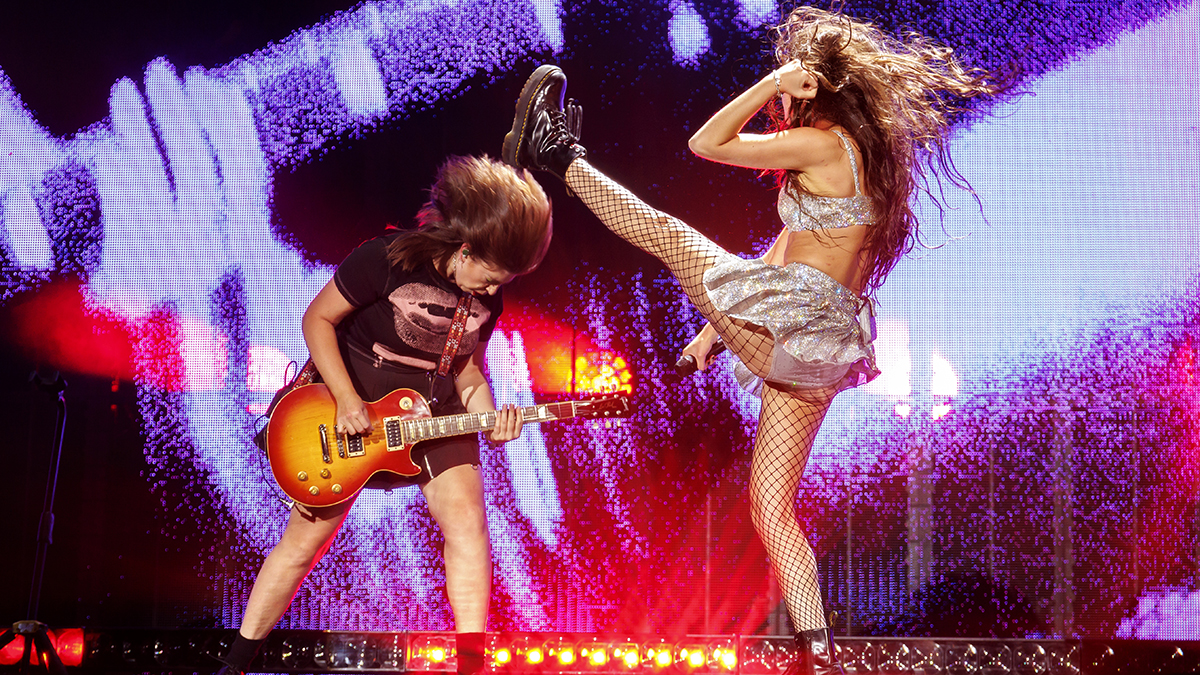“When I do the solo I’m actually out front on the stage with Olivia jumping around, but we MIDI-mapped the expression pedal so it’ll do all the whammy changes”: Olivia Rodrigo guitarist Emily Rosenfield spills her Guts World Tour secrets
Fellow guitarist Daisy Spencer and bassist Moa Munoz have also been talking gear and tone

She might be tagged as a ‘pop artist’, but Olivia Rodrigo’s Guts World Tour shows rock pretty damn hard.
Both of Rodrigo’s albums lean pretty heavily into the pop-punk sound, and this has been brought to the stage by a band that includes Emily Rosenfield and Daisy Spencer on guitars, Moa Munoz on bass, Hayley Brownwell on the drums and Camila Mora on the keys.
Now, in an interview with Premier Guitar, Rosenfield, Spencer and Munoz have been discussing their setups, sounds and on-stage secrets.
Those who are familiar with it will know that the Guts show kicks into gear immediately with set-opener Bad Idea Right?, the second single from 2023’s Guts album. Here, Emily Rosenfield often uses a Gibson Kirk Douglas Signature SG, a guitar that she thinks is in keeping with the song’s punchy aesthetic.
“It’s got this kind of like Jack White vibe to it, in a way, and a lot of Olivia’s music is really influenced by him and by that type of music,” she says. “I just thought it really suited, like, tonally, the music, and then also, visually, it’s a rad guitar”.
Rosenfield says that she likes to ride all over the pickup, tone and volume controls, and runs a Kemper Profiler with volume and expression pedals. The last of these, it turns out, is essential to recreating one of Bad Idea Right?’s standout sections.
“There’s this very Jack White-esque solo, and I’m using the expression [pedal] to get that kind of like ‘whammy’ sound,” says Rosenfield. “But what’s kind of cool is that we have everything MIDI-mapped, over in playback, so when I do the solo I’m actually out front on the stage with Olivia jumping around, but we MIDI-mapped the expression pedal into the box so it’ll do all the whammy changes”.
Want all the hottest music and gear news, reviews, deals, features and more, direct to your inbox? Sign up here.
In fact, MIDI mapping is used throughout the show, which frees up the band members to concentrate on nailing their performances.
“It’s really great that we do have everything MIDI-mapped and programmed so we can just worry about playing and having fun,” says Rosenfield.
Rosenfield also gives us a quick blast of Obsessed, a song that Rodrigo co-wrote with Annie Clark (AKA St VIncent). “This is a very Jack White-inspired song as well,” she says.
All American Bitch, meanwhile, calls for a quick switch between acoustic and electric guitar sounds, so step forward a Fender Acoustasonic Jazzmaster, which is tailor-made for the job. Here, Rosenfield uses IRs for the acoustic tone and then dials in an electric patch that’s “like a big AC30 kind of drive”.
Rosenfield also has another Gibson model in her locker - the most famous one of all, in fact - and she’s not in the least bit embarrassed about it. Indeed, it's another that's been used to play that Bad Idea Right? solo.
“Les Pauls get a bad rap,” she says. “They kind of get branded as ‘dad guitars’, but I’m reclaiming it. I’m not a mom, so I can’t say mom guitar, but I just think they’re badass and they sound so good for all the rock stuff in the show.”
Daisy Spencer, meanwhile, names their Shabat Guitars Leopard as the one they use most on the Guts tour - “it does the rock tones great, it does the clean tones great” - and cites My Bloody Valentine as the inspiration for their “wall of sound” tone. Working with bass player Moz Munez, Spencer says that the two of them provide the “underbelly” of the sound, offering texture, meat and - of course - potatoes.
If you haven’t yet seen the Guts World Tour - or if you simply want to relive it - it’s coming to Netflix on 29 October.

I’m the Deputy Editor of MusicRadar, having worked on the site since its launch in 2007. I previously spent eight years working on our sister magazine, Computer Music. I’ve been playing the piano, gigging in bands and failing to finish tracks at home for more than 30 years, 24 of which I’ve also spent writing about music and the ever-changing technology used to make it.

